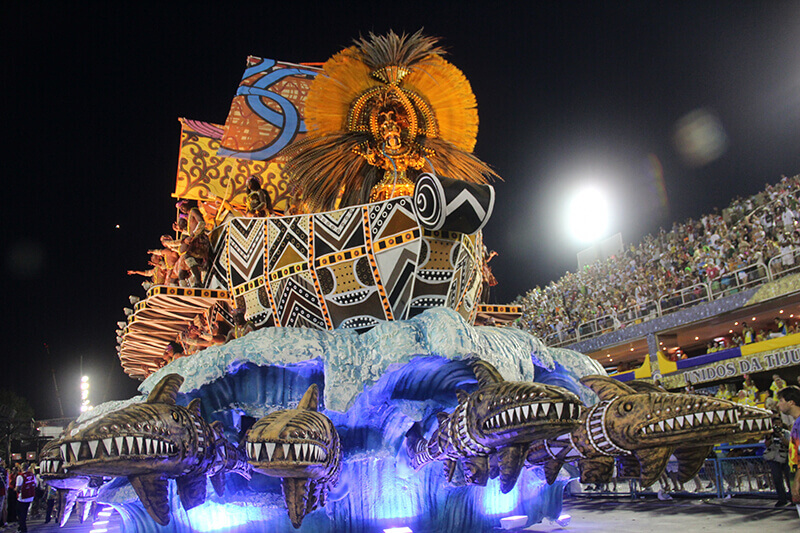The Carnival is celebrated in Brazil every year, 46 days before Easter. The Carnival in Brazil as we know it today is believed to have originated during the European dominated era. Back then, followers of the Roman Catholic Church would indulge in a final day of dance, fun, alcohol and sex just before the start of Lent, a period of abstinence from alcohol and other sins. In 2017, the Carnival in Rio de Janeiro will take place from February 25th to February 28th.

Different cities of Brazil have their own way of celebrating this festival, however, the most famous carnival is that of Rio de Janeiro. Rio de Janeiro’s Carnival celebration is undoubtedly the planet’s most ostentatious, bombastic, mind-blowing spectacle, uniting millions of Brazilians and visitors within the lush environs of the Marvelous City in rapturous merriment over the 4 days of party. Also on tap are popular itinerant street parties called blocos, and chic, high-gloss costumed balls called bailes. Non-Carnival-related commerce and industry in Rio completely shut down for the fun, so there is no escape from the intense debauchery. Thousands of people throng the Sambadrome stadium in the city, often wearing masks and colorful costumes, they dance to the beats of drums and music, Samba being the most prevalent form of dancing here. Rio's Carnival is heavily influenced by the favelas, as its residents are often members of local samba schools and participate extensively in group performances. Every neighborhood in the city has its own street band, with more than 400 bands participating in the revelry. The celebration is the culmination of months of preparation and brings many different types of people together.
The Sambadrome
Designed by famous Brazilian architect Oscar Niemeyer, the Sambadrome is Rio’s ‘stadium of samba’. Basically, it’s a permanent parade route lined with concrete spectator stands which can seat around 70,000 people. Each year during Carnival, the Sambadrome is the setting for extravagant parades put on by Rio’s numerous samba schools. Stretching along for 700m (or almost half a mile), the Sambadrome is located along a stretch of Avenida Marquês de Sapucaí between Avenida Presidente Vargas and Rua Frei Caneca. You need to have a ticket to check out the parades at the Sambadrome during carnival; keep in mind that ticket prices vary depending on the location of the seats in the stands, from R$10 to over R$5,000 for the privilege of cheering on your favorite schools amid the unmatched energy of Carnival (Click here to buy your tickets for the Carnival in Rio’s Sambadrome).

With a parade tradition stretching as far back as the 1930s, Rio is home to over 70 samba schools. Representing modest neighborhoods from throughout the metropolitan area, the largest and most creative schools (collectively, the Grupo Especial) end up competing for cash and nationwide fame in the Sambadrome.
The competition itself, televised nationally late into the night on the Sunday and Monday of Carnival, consists of a series of performances in which each of the top 12 samba school’s roughly 3,000 members sing and dance nonstop -- with calculated precision for 90 minutes, dressed in dazzling costumes atop monumental floats and slowly parading down the length of the Sambadrome to the wild cheering of fans and the intense scrutiny of the parade judges. The judges consider each school’s performance in categories such as song lyrics, drumming cadence and precision, costumes, overall harmony and allegorical theme, with the lowest scoring schools relegated to the second-string Grupo de Acesso. Themes include whimsical homages to various world cities, historical events, and Brazilian personalities.
Rio’s Exclusive Carnival Balls
In keeping with the European origins of Carnival, Rio’s formal masquerade balls and nightclub parties, bailes, add an air of exclusivity to the fete that can be fun … if not taken too seriously. The Copacabana Palace Hotel, the undisputed grand dame of the Rio oceanfront, holds the annual Magic Ball, requiring guests to wear evening gowns, tuxedos or elegantly expensive costumes. The Museum of Modern Art (MAM) hosts the Baile Glamurama, featuring live Brazilian pop and samba performances (costumes required). In Centro, the vast Scala showplace hosts themed balls each night of Carnival, culminating in the boisterous Scala Gay Gala, the city’s largest LGBT Carnival event. Tickets for each of the balls range from R$100 to R$500 and can be purchased in advance by contacting the venue.
Dancing to the Carnival Beat

Rambunctious street parties called blocos command Rio’s complete attention: The celebrations run from 8 in the morning to almost 8 the next morning. Donning homemade costumes and downing inordinate amounts of beer and cachaça (Brazilian rum), crowds numbering in the hundreds of thousands doff ideas of personal space and congregate throughout Centro and the Zona Sul to flirt and frolic to the beats of Carnival parade drummers, kitchen utensils banged together, old-school boom boxes blasting pop music or just the rhythm of the multitudes.
Blocos pop up throughout Rio, so you won’t have any trouble finding or joining one, but the biggest must-dos include Santa Teresa’s traditional Bloco das Carmelitas and Céu na Terra, Bloco Virtual in Rio’s Zona Sul area of Leme, Flamengo’s Beatles-themed Bloco do Sargento Pimenta, the favorite Orquestra Voadora also in Flamengo neighborhood, and the absolutely massive Monobloco, wrapping things up in Centro (for dates and times, click here). These street parties are the best part of Carnival, so much fun but really intense and crowded. Just be careful with your money (it’s better to keep it stashed in your underwear) and leave your phone at home, so you can enjoy the parties at the most without worries!

Accommodation in Rio
Accommodation in Rio during the Carnival can be extremely expensive (sometimes 5x normal rates), therefore it is important that you reserve your accommodation well in advance. If you're looking to save money and have a more authentic Carioca experience, look to stay in one of Rio’s vibrant pacified favelas such as Vidigal. To reserve a room or inquire about prices at the amazing FAVEX Vidigal hostel click here or email us at info@favelaexperience.com

In addition, if you're interested in complimenting your Carnival experience with a community based favela tour check out all the amazing experiences we offer at www.favelaexperience.com/experiences.
So, if you’re planning on heading to Carnival in Rio, hopefully we’ve given you some insight into what you can expect from the Rio Carnival, one of the world’s wildest parties.